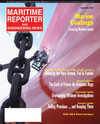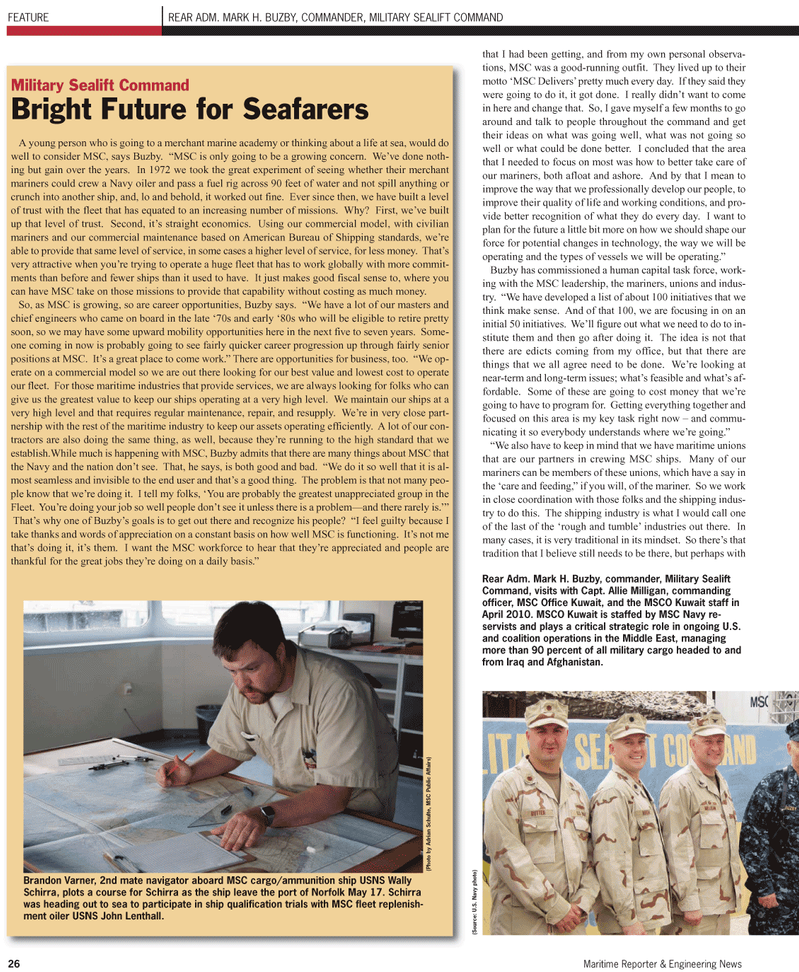
Page 26: of Maritime Reporter Magazine (September 2010)
Marine Propulsion Edition
Read this page in Pdf, Flash or Html5 edition of September 2010 Maritime Reporter Magazine
26 Maritime Reporter & Engineering News
FEATURE REAR ADM. MARK H. BUZBY, COMMANDER, MILITARY SEALIFT COMMAND
Military Sealift Command
Bright Future for Seafarers
A young person who is going to a merchant marine academy or thinking about a life at sea, would do well to consider MSC, says Buzby. “MSC is only going to be a growing concern. We’ve done noth- ing but gain over the years. In 1972 we took the great experiment of seeing whether their merchant mariners could crew a Navy oiler and pass a fuel rig across 90 feet of water and not spill anything or crunch into another ship, and, lo and behold, it worked out fine. Ever since then, we have built a level of trust with the fleet that has equated to an increasing number of missions. Why? First, we’ve built up that level of trust. Second, it’s straight economics. Using our commercial model, with civilian mariners and our commercial maintenance based on American Bureau of Shipping standards, we’re able to provide that same level of service, in some cases a higher level of service, for less money. That’s very attractive when you’re trying to operate a huge fleet that has to work globally with more commit- ments than before and fewer ships than it used to have. It just makes good fiscal sense to, where you can have MSC take on those missions to provide that capability without costing as much money.
So, as MSC is growing, so are career opportunities, Buzby says. “We have a lot of our masters and chief engineers who came on board in the late ‘70s and early ‘80s who will be eligible to retire pretty soon, so we may have some upward mobility opportunities here in the next five to seven years. Some- one coming in now is probably going to see fairly quicker career progression up through fairly senior positions at MSC. It’s a great place to come work.” There are opportunities for business, too. “We op- erate on a commercial model so we are out there looking for our best value and lowest cost to operate our fleet. For those maritime industries that provide services, we are always looking for folks who can give us the greatest value to keep our ships operating at a very high level. We maintain our ships at a very high level and that requires regular maintenance, repair, and resupply. We’re in very close part- nership with the rest of the maritime industry to keep our assets operating efficiently. A lot of our con- tractors are also doing the same thing, as well, because they’re running to the high standard that we establish.While much is happening with MSC, Buzby admits that there are many things about MSC that the Navy and the nation don’t see. That, he says, is both good and bad. “We do it so well that it is al- most seamless and invisible to the end user and that’s a good thing. The problem is that not many peo- ple know that we’re doing it. I tell my folks, ‘You are probably the greatest unappreciated group in the
Fleet. You’re doing your job so well people don’t see it unless there is a problem—and there rarely is.’”
That’s why one of Buzby’s goals is to get out there and recognize his people? “I feel guilty because I take thanks and words of appreciation on a constant basis on how well MSC is functioning. It’s not me that’s doing it, it’s them. I want the MSC workforce to hear that they’re appreciated and people are thankful for the great jobs they’re doing on a daily basis.” (Photo by Adrian Schulte, MSC Public Af fairs)
Brandon Varner, 2nd mate navigator aboard MSC cargo/ammunition ship USNS Wally
Schirra, plots a course for Schirra as the ship leave the port of Norfolk May 17. Schirra was heading out to sea to participate in ship qualification trials with MSC fleet replenish- ment oiler USNS John Lenthall. that I had been getting, and from my own personal observa- tions, MSC was a good-running outfit. They lived up to their motto ‘MSC Delivers’ pretty much every day. If they said they were going to do it, it got done. I really didn’t want to come in here and change that. So, I gave myself a few months to go around and talk to people throughout the command and get their ideas on what was going well, what was not going so well or what could be done better. I concluded that the area that I needed to focus on most was how to better take care of our mariners, both afloat and ashore. And by that I mean to improve the way that we professionally develop our people, to improve their quality of life and working conditions, and pro- vide better recognition of what they do every day. I want to plan for the future a little bit more on how we should shape our force for potential changes in technology, the way we will be operating and the types of vessels we will be operating.”
Buzby has commissioned a human capital task force, work- ing with the MSC leadership, the mariners, unions and indus- try. “We have developed a list of about 100 initiatives that we think make sense. And of that 100, we are focusing in on an initial 50 initiatives. We’ll figure out what we need to do to in- stitute them and then go after doing it. The idea is not that there are edicts coming from my office, but that there are things that we all agree need to be done. We’re looking at near-term and long-term issues; what’s feasible and what’s af- fordable. Some of these are going to cost money that we’re going to have to program for. Getting everything together and focused on this area is my key task right now – and commu- nicating it so everybody understands where we’re going.” “We also have to keep in mind that we have maritime unions that are our partners in crewing MSC ships. Many of our mariners can be members of these unions, which have a say in the ‘care and feeding,” if you will, of the mariner. So we work in close coordination with those folks and the shipping indus- try to do this. The shipping industry is what I would call one of the last of the ‘rough and tumble’ industries out there. In many cases, it is very traditional in its mindset. So there’s that tradition that I believe still needs to be there, but perhaps with
Rear Adm. Mark H. Buzby, commander, Military Sealift
Command, visits with Capt. Allie Milligan, commanding officer, MSC Office Kuwait, and the MSCO Kuwait staff in
April 2010. MSCO Kuwait is staffed by MSC Navy re- servists and plays a critical strategic role in ongoing U.S. and coalition operations in the Middle East, managing more than 90 percent of all military cargo headed to and from Iraq and Afghanistan. (Sour ce: U.S. Navy photo)

 25
25

 27
27
